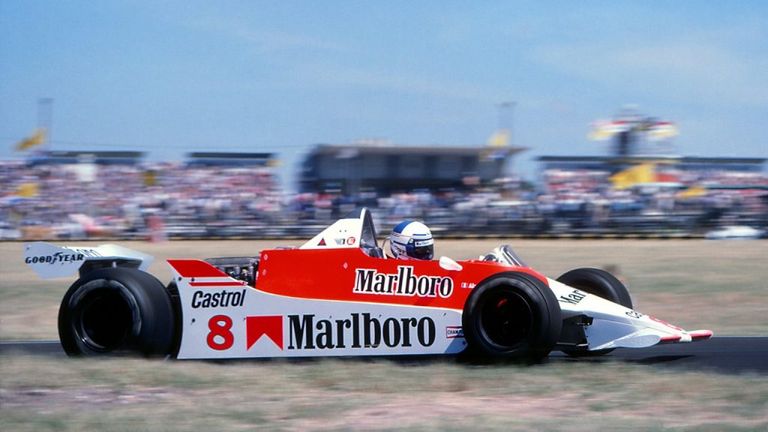
Hay personas que pasan a la historia, en cualquier deporte, a veces son apodos y otras veces como en la Fórmula con arquetipos que definen los pilotos en su esencia deportiva.
Por ejemplo si hablamos de Ayrton Senna hablamos del "intrépido" por su constante búsqueda de la velocidad, asumiendo todos los riesgos posibles, los calculados y los no calculados y que por ironía del destino (aunque poco tiene que ver la velocidad con los accidentes mortales) lo llevaron a un triste final. En ese misma línea podemos incluir al sueco Ronnie Peterson también con un trágico final.
Si en cambio nos referimos a Niki Lauda hablamos del "calculador" austríaco que llevó a Ferrari a un gran número de victorias explotando todos los detalles de la máquina a un límite casi maniacal. Era la contracara de Senna y sin embargo poco faltó para que tuviera un final similar. Con estas características encontramos en el pasado a un emblemático Carlos Alberto Reuteman cuando corría con Brabham y también en tiempos modernos aunque más veloz encontramos a un Michael Schumacher identificado con Ferrari como pocos a pesar de no ser italiano.
La lista sería mucho más extensa, incoporando a tantos pilotos en un escalón intermedio. Simplemente me he referido a los más notorios y que han sido, por ejemplo la mayoría de ellos, campeones mundiales.
Hoy me quiero referir a Alain Prost, apodado por la mayor parte de la crítica especializado y por sus seguidores como "El Profesor" por la estrategia y la técnica para preparar su propia monoposto, al lado de los mecánicos. Algunos llegaron a hipotizar que era, casi, un mecánico más debido a las horas pasadas en los talleres, actitud que muchos pilotos de Fórmula 1 desdeñan bastante.

There are people who go down in history, in any sport, sometimes they are nicknames and other times as in Formula with archetypes that define the drivers in their sporting essence.
For example, if we talk about Ayrton Senna, we talk about the "fearless" for his constant search for speed, taking all possible risks, calculated and uncalculated, and that by irony of fate (although speed has little to do with fatal accidents) led him to a sad end. In the same line we can include the Swedish Ronnie Peterson also with a tragic end.
If instead we refer to Niki Lauda, we are talking about the Austrian "calculator" who took Ferrari to a great number of victories exploiting all the details of the machine to an almost maniacal limit. He was Senna's counterpart and yet he was not far from having a similar end. With these characteristics we find in the past an emblematic Carlos Alberto Reuteman when he raced with Brabham and also in modern times, although faster, we find a Michael Schumacher identified with Ferrari like few others despite not being Italian.
The list would be much longer, including so many drivers in an intermediate step. I have simply referred to the most notorious and who have been, for example most of them, world champions.
Today I want to refer to Alain Prost, nicknamed by most of the specialized critics and by his followers as "The Professor" because of his strategy and technique to prepare his own monoposto, together with the mechanics. Some even hypothesized that he was, almost, just another mechanic because of the hours he spent in the workshops, an attitude that many Formula 1 pilots are quite disdainful of.
Alain Prost "El Profesor" un gran estratega de las carreras./ Alain Prost "The Professor" a great racing strategist.
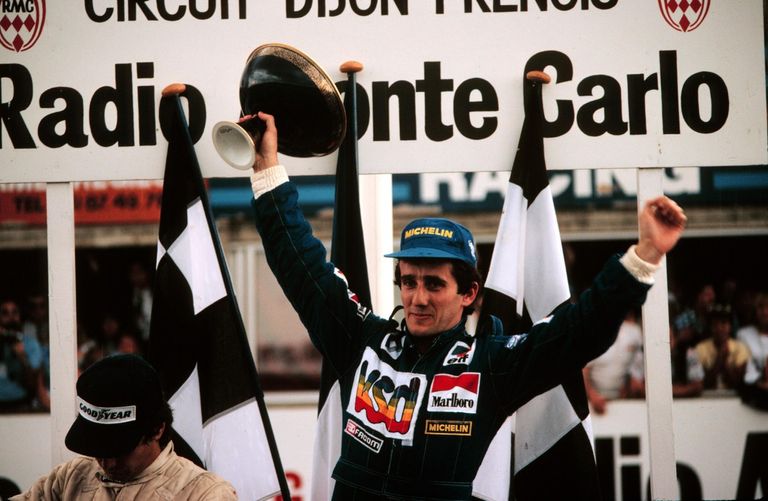
Frio, analítico, inteligente para preparar las rivales, no mezquinaba el acelerador cuando las circunstancias lo permitían. Sus duelos nada menos que con Ayrton Senna, Nelson Piquet y Nigel Mansell son un ejemplo.
Con algunas cábalas cercanas a la superstición. Por ejemplo mostraba un marcado fastidio por el asfalto mojado. Y no usaba (casi) nunca viseras oscuras porque tenía una especial resistencia en sus ojos a la luminosidad, era casi insensible a la luz del sol. Para verlo correr con una visera oscura en su casco tenían que ser condiciones ambientales al límite de la visibilidad y del resplandor.
Otra de las manías del francés era mirar muy poco el tablero de su auto ya que sostenía que al bajar la mirada hacia el mismo imperceptiblemente se alzaba el pie del acelerador perdiendo entre 200 y 300 vueltas de rotación
El mismo Jean Todt jefe de mecánicos de Ferrari en la "era Schumacher" y hoy presidente de la FIA ha dicho que era un piloto único, que ganaba las carreras "solo", es decir sin todo el apoyo anímico y psicológico que prestan los teams a sus corredores.

Cold, analytical, intelligent to prepare the rivals, he did not hesitate to use the accelerator when the circumstances allowed it. His duels with no less than Ayrton Senna, Nelson Piquet and Nigel Mansell are an example.
With some cabals close to superstition. For example, he showed a marked dislike for wet asphalt. And he (almost) never wore dark visors because he had a special resistance in his eyes to luminosity, he was almost insensitive to sunlight. To see him race with a dark visor on his helmet, the environmental conditions had to be at the limit of visibility and glare.
Another of the Frenchman's manias was to look very little at the dashboard of his car, as he maintained that when he looked down at the dashboard he would imperceptibly lift his foot off the accelerator, losing between 200 and 300 turns of rotation.
Jean Todt himself, Ferrari's chief mechanic during the "Schumacher era" and today president of the FIA, has said that he was a unique driver, who won races "alone", that is, without all the emotional and psychological support that teams give to their drivers.
Más de una década en Fórmula Uno. / More than a decade in Formula One.
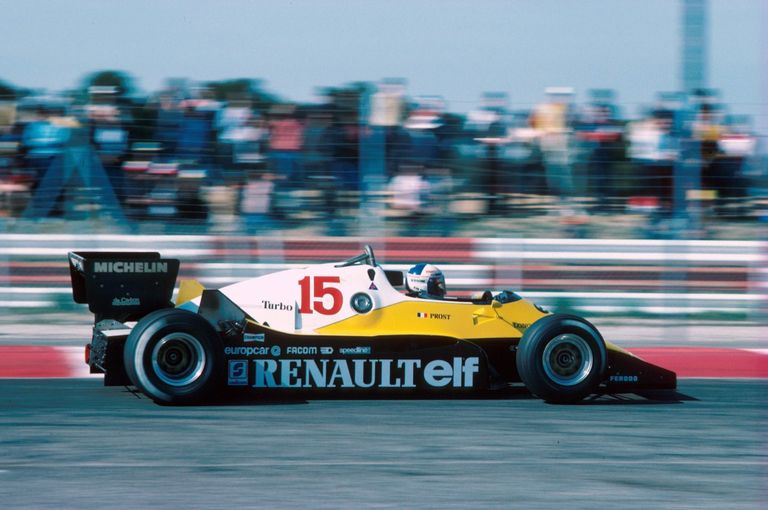
Debuta en el año 1980 con McLaren en el Gran Premio de Argentina en una carrera ganada por el australiano Alan Jones que corría con Williams. Y tiene que luchar con denuedo para recoger pocos puntos y terminar el Campeonato Mundial de Pilotos con solo cinco puntos en una anómima décimosexta posición.
Insatisfecho con el monoplaza firma para Renault donde desarrollará la parte siguiente de su carrera durante tres años mostrando un paulatino consolidamiento.
Quinto en el Mundial de Pilotos durante el año siguiente (1981) obtiene en la octava carrera disputada en Francia su pais natal en el circuito de Digione, su primera victoria en F1. A la que le siguen las obtenidas en el mismo año en Países Bajos (circuito de Zandvoort) e Italia (Monza).
Sigue mejorando sus prestaciones con Renault y en 1982 termina cuarto un escalón más arriba del año anterior aunque gana menos, solo dos carreras (las dos primeras del campeonato en Sudáfrica y Brasil) con numerosos retiros. Renaul no se revela confiable en su totalidad y registra ocho abandonos en la temporada.
Sin embargo el campeonato de pilotos se le sigue escapando. En su última temporada en Renault antes de pasar de nuevo a McLaren termina segundo en los años 1983 y 1984 en el Mundial de Pilotos.
Las dos temporadas siguientes marcan el dominio de Prost y McLaren en la fórmula 1 coronándose campeón en ambas oportunidades. Con un número discreto de victorias: 5 en el 1985 y 4 en el 1986. A partir de este momento coimienza a nacer el apodo de "el profesor". McLaren no un monoplaza super-poderoso. Sin embargo en manos del francés rinde al máximo.
Los dos años sucesivos marcan una rara paradoja: en 1987 lo terminan traicionando varios retiros finalizando cuarto en el Mundial y en 1988 que es el año en absoluto que más victorias obtiene (siete) termina solo segundo.
Vuelve a coronarse campeón en 1989 con McLaren y en 1993 con Williams año de su retiro de la Fórmula 1 sin poder igualar la marca de Fangio de cinco campeonatos ganados. En el medio había corrido con Ferrari terminando segundo y quinto en el campeonato.
Lo que determina su capacidad como estratega son las estadísticas: de los 202 grandes premios corridos en 106 (es decir más de la mitad) llegó al podio mientras que las victorias llegaron a 51.
En otras palabras llegó al podio más del 50% de los GP que corrió y ganó de ellos, la mitad.

He made his debut in 1980 with McLaren at the Argentine Grand Prix in a race won by the Australian Alan Jones who raced with Williams. And he has to fight hard to collect few points and finish the World Drivers' Championship with only five points in an anomalous sixteenth position.
Unsatisfied with the single-seater, he signs for Renault where he will develop the next part of his career for three years, showing a gradual consolidation.
Fifth in the World Drivers' Championship the following year (1981), he obtained his first F1 victory in the eighth race held in France, his native country, at the Digione circuit. This was followed by victories in the same year in the Netherlands (Zandvoort circuit) and Italy (Monza).
He continues to improve his performance with Renault and in 1982 he finishes fourth, one step higher than the previous year, although he wins less, only two races (the first two of the championship in South Africa and Brazil) with numerous retirements. Renaul does not prove to be reliable as a whole and records eight retirements during the season.
However, the drivers' championship continues to elude him. In his last season at Renault before moving back to McLaren, he finishes second in the 1983 and 1984 World Drivers' Championship.
The following two seasons marked the dominance of Prost and McLaren in Formula 1, being crowned champion on both occasions. With a discreet number of victories: 5 in 1985 and 4 in 1986. From this moment on, the nickname of "the professor" was born. McLaren is not a super-powerful single-seater. However, in the Frenchman's hands it performed at its best.
The following two years marked a rare paradox: in 1987 he was betrayed by several retirements, finishing fourth in the World Championship and in 1988, the year in which he obtained the most victories (seven), he finished only second.
He was crowned champion again in 1989 with McLaren and in 1993 with Williams, the year of his retirement from Formula 1, without being able to equal Fangio's record of five championships won. In between he had raced with Ferrari finishing second and fifth in the championship.
What determines his ability as a strategist are the statistics: of the 202 Grand Prix races he raced in 106 (i.e. more than half) he reached the podium while the victories reached 51.
In other words, he reached the podium in more than 50% of the GPs he raced and won half of them.
Suzuka, la carrera polémica. / Suzuka, the controversial race.
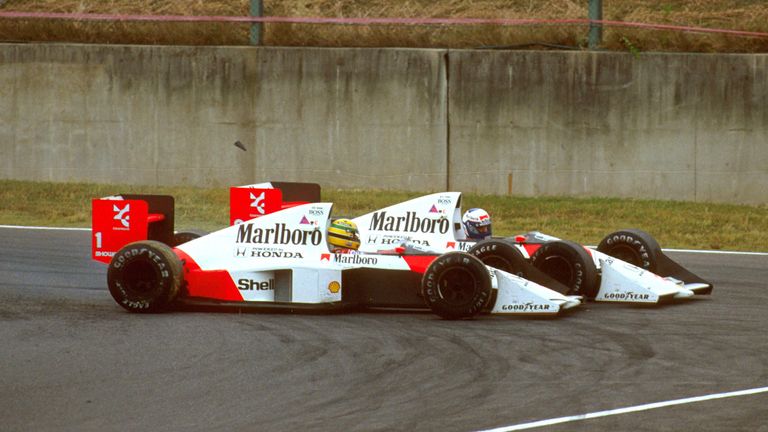
Quedará siempre guardada en la retina y la memoria de los aficcionados la carrera de Susuka en Japón donde Ayrton Senna y Alain Prost dieron una verdadera batalla.
Ayrton Senna fiel a su estilo le ganó la frenada a Prost en l entrada a la chicana y el francés cerró su trayetcoria sin toicar al brasileño pero encerrándolo e impidiendo de proseguir. Prost apagó el motor (o se apagó solo el motor de Ferrari) y el francés se bajó de su auto abandonando la carrera.
Senna imposibilitado de repartir por sus propios medios se hizo ayudar por los auxiliares de la pista que empujaron el auto. Por ello el brasileño será descalificado .
En el circuito de Suzuka en Japón en 1989 se escenificó una de las batallas épicas de la historia de la F1 y la astucia de Alain burló la determinación de Senna: el brasileño le flanqueó en la frenada de la chicane y Prost cerró la trayectoria, bloqueando los dos monoplazas en un abrazo. Alain se bajó y se fue. Senna reanudó, siendo empujado por los comisarios lo que motivó su inmediata descalificación y el título para Prost. Fue el inicio de la discordia entre ambos pilotos que continuaron enfrentándose en las pistas al límite del reglamento.

The Susuka race in Japan, where Ayrton Senna and Alain Prost fought a real battle, will always remain in the memory of the fans.
Ayrton Senna, true to his style, won the braking from Prost at the entrance to the chicane and the Frenchman closed his path without touching the Brazilian but locking him up and preventing him from continuing. Prost turned off the engine (or only the Ferrari engine turned off) and the Frenchman got out of his car, abandoning the race.
Senna, unable to continue by his own means, was helped by the track assistants who pushed the car. For this reason, the Brazilian will be disqualified.
At the Suzuka circuit in Japan in 1989, one of the epic battles in F1 history was staged and Alain's cunning outwitted Senna's determination: the Brazilian flanked him at the chicane braking and Prost closed the trajectory, locking the two cars in an embrace. Alain got out and drove off. Senna restarted, being pushed by the stewards, which led to his immediate disqualification and the title for Prost. It was the beginning of the discord between the two drivers who continued to clash on the track at the limit of the rules.
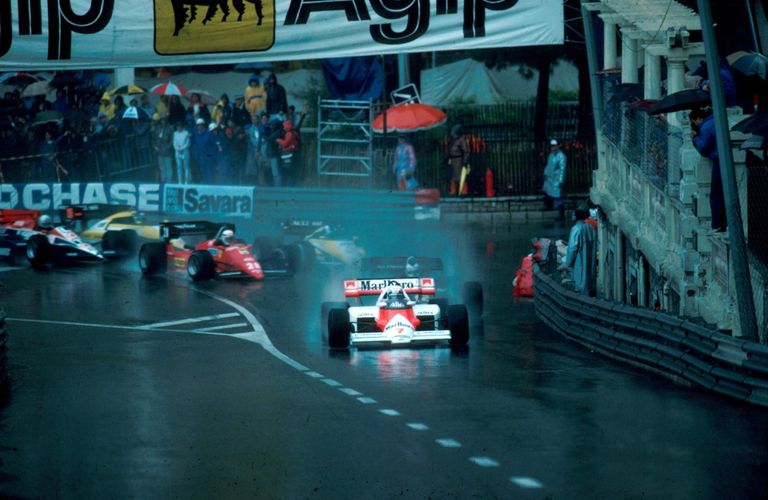




Upvoted. Thank You for sending some of your rewards to @null. Get more BLURT:
@ mariuszkarowski/how-to-get-automatic-upvote-from-my-accounts@ blurtbooster/blurt-booster-introduction-rules-and-guidelines-1699999662965@ nalexadre/blurt-nexus-creating-an-affiliate-account-1700008765859@ kryptodenno - win BLURT POWER delegationNote: This bot will not vote on AI-generated content
Thanks @ctime!